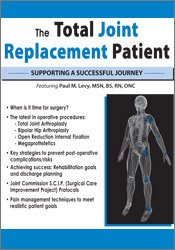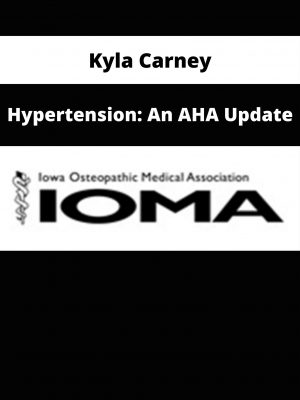Paul M. Levy – The Total Joint Replacement Patient Supporting a Successful Journey
$219 Original price was: $219.$62Current price is: $62.
Shopping Instructions:
- DISCOUNT 15% : SHOP15
- Product Delivery: Within 1 – 12 hours after purchase.
Available for Pre-Order. This product will be available within a few days.
Paul M. Levy – The Total Joint Replacement Patient Supporting a Successful Journey
Description:
- When is it time for surgery?
- The latest in operative procedures:
- Total Joint Arthroplasty
- Bipolar Hip Arthroplasty
- Open Reduction Internal Fixation
- Megaprothstetics
- Key strategies to prevent post-operative complications/risks
- Achieving success: Rehabilitation goals and discharge planning
- Joint Commission S.C.I.P. (Surgical Care Improvement Project) Protocols
- Pain management techniques to meet realistic patient goals
Joint replacement surgeries have become common place – over a million performed per year. Paul M. Levy, MSN, BS, RN, ONC is excited to share his expertise in orthopedics to provide a better understanding of Total Joint Replacement Surgery:
- Pre-operative diagnosis: When is it time for surgery? Alternative treatments?
- Multiple joint replacements & the implications of each
- The key to preventing post-operative complications/risks
- All the options: Megaprosthetic replacements, fixations, joint revisions…
- Achieving success: Rehabilitation goals and discharge planning
Recent changes to CMS reimbursement (Value Based Purchasing or VBP) processes have put a premium on ensuring patient satisfaction is achieved. Failure to meet baseline measurements in HCAHPS scores will result in decreased reimbursements for hospitals. In addition, 30-day readmission rates also will affect VBP scores. This recording will provide strategies to address the following areas that can impact VBP:
- Co-morbidity – discussion of medical management of preexisting conditions
- Pain Management – setting and meeting realistic pain management goals
- Communication – focus on patient education and follow-up care
- Readmission – focus on tools to reduce infection and post-operative complications
This recording will leave with you a clear understanding of the entire process from start to finish for total joint patients. This will in turn allow interdisciplinary healthcare professionals to help their patients better understand the process, have realistic expectations, and improved satisfaction following surgical interventions.
Objectives
- Evaluate the key indications for timing of joint replacement surgery.
- Compare treatment options for patients with severe joint pain.
- Analyze options for pre-operative education to make multiple learning modalities available to patients.
- Examine the necessary rationale for pre-operative testing.
- Summarize the Joint Commission SCIP Protocols as related to Total Hip Arthroplasty, Total Knee
- Arthroplasty, Hip and Knee Revisions, and Hip Fracture repairs (ORIF).
- Assess a multi-modal approach to post-operative pain.
- Determine preventive measures for the most significant post-surgical complications that can occur.
- Distinguish between the most effective planning strategies for patient success following hospital discharge.
Outline
Pre-operative Work-up
- The pre-operative work-up is a vitally important part of the operative process. Not all patients with arthritis require surgery. Knowing the treatment options allows patients to make informed decisions about their care. Radiology examples will be included for case study discussion.
Diagnosis
- Osteoarthritis
- Bone Cancers
- Recurrent Infections
- Acute Injury, Falls, i.e.
Treatment Options
- Exercise / Physical Therapy
- Injections
- Operative Treatments
Pre-operative Planning
- Understanding the processes that need to take place prior to the surgery will help the patient better prepare for the surgery, allow for less patient anxiety and establish realistic goals and expectations.
- Pre-operative Testing
- Pre-operative Clearances
- Medical
- Cardiac
- Pulmonary
- Other/Individualized
- Obtaining Consent
- Pre-operative Education
- One-to-one education
- Online education
- Pre-operative joint classes
Surgical Procedures
- Fixation
- Treatment for fractures that do not require joint replacement
- Total Joint Replacement
- Hip
- Knee
- Shoulder
- Other Joints
- The elbow, wrist, and ankle can also be replaced, but these surgeries are performed far less frequently. As well, there is currently a disk replacement surgery in study, but it is not yet FDA approved.
- Megaprosthetic Replacements
- Replacement of both the joint and a portion of the surrounding bone
- Joint Revisions
Immediate Post-Operative Care
- Multi-modal Pain Management
- Oral vs. IV
- Nerve blocks
- Ambulation
- IV acetaminophen / NSAIDs
- Intra-operative steroid injection
- Age-related analgesia
- Opioid tolerance
- Physical and Occupational Therapy
- Positioning
- Movement restrictions
- Exercises
- Assistive devices
- Wound Care / Infection Prevention
- Dressings
- Antibiotics
- VTE Prophylaxis
- Mechanical
- Pharmaceutical
- Joint Commission S.C.I.P. (Surgical Care Improvement Project) Protocols
- Surgical/Medical Complications
Would you like to receive Paul M. Levy – The Total Joint Replacement Patient Supporting a Successful Journey ?
Post-acute Care and Follow-up
- Discharge Planning
- Acute Rehab / Skilled Nursing / Home
- Follow-up appointments
- Home medications
- Readmission/complications
Related products
HEALTH & MEDICAL
HEALTH & MEDICAL
HEALTH & MEDICAL
Regina Meredith – Conscious Media Network with Regina Meredith – Eric Pearl on The Reconnection
HEALTH & MEDICAL
HEALTH & MEDICAL
Gaia—Creating-High-Voltage-Health-with-Glenn-Streeter-Open-Minds
HEALTH & MEDICAL
HEALTH & MEDICAL












